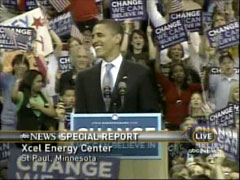
|
Obama’s
Margin of Victory: The Media EXECUTIVE SUMMARY  It was the closest nomination contest in a
generation, with just one-tenth of a percentage point — 41,622 votes out of more
than 35 million cast — separating Barack Obama from Hillary Clinton when the
Democratic primaries ended in June. Obama’s margin among elected delegates was
almost as thin, just 51 to 48 percent. It was the closest nomination contest in a
generation, with just one-tenth of a percentage point — 41,622 votes out of more
than 35 million cast — separating Barack Obama from Hillary Clinton when the
Democratic primaries ended in June. Obama’s margin among elected delegates was
almost as thin, just 51 to 48 percent.But Barack Obama had a crucial advantage over his rivals this year: the support of the national media, especially the three broadcast networks. At every step of his national political career, network reporters showered the Illinois Senator with glowing media coverage, building him up as a political celebrity and exhibiting little interest in investigating his past associations or exploring the controversies that could have threatened his campaign. These are the key findings of the Media Research Center’s exhaustive analysis of ABC, CBS and NBC evening news coverage of Barack Obama — every story, every soundbite, every mention — from his first appearance on a network broadcast in May 2000 through the end of the Democratic primaries in June 2008, a total of 1,365 stories. MRC analysts found that the networks’ coverage — particularly prior to the formal start of Obama’s presidential campaign — bordered on giddy celebration of a political "rock star" rather than objective newsgathering. Key Findings: Perhaps if he had faced serious journalistic scrutiny instead of media cheerleading, Barack Obama might still have won his party’s nomination. But the tremendously positive coverage that the networks bestowed upon his campaign was of incalculable value. The early celebrity coverage helped make Obama a nationally-known figure with a near-perfect media image. The protectiveness that reporters showed during the early primaries made it difficult for his rivals to effectively criticize him. And when it came to controversies such as the Wright affair, network reporters acted more as defenders than as journalists in an adversarial relationship. If the media did not actually win the Democratic nomination for Barack Obama, they surely made it a whole lot easier. |
|
The Media Research Center To schedule an interview, please contact Colleen O'Boyle or Tim Scheiderer at (703) 683-5004
Home | News Division
| Bozell Columns | CyberAlerts |












